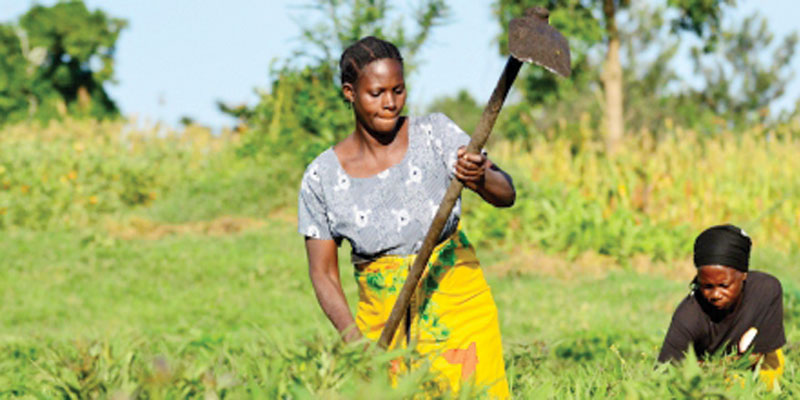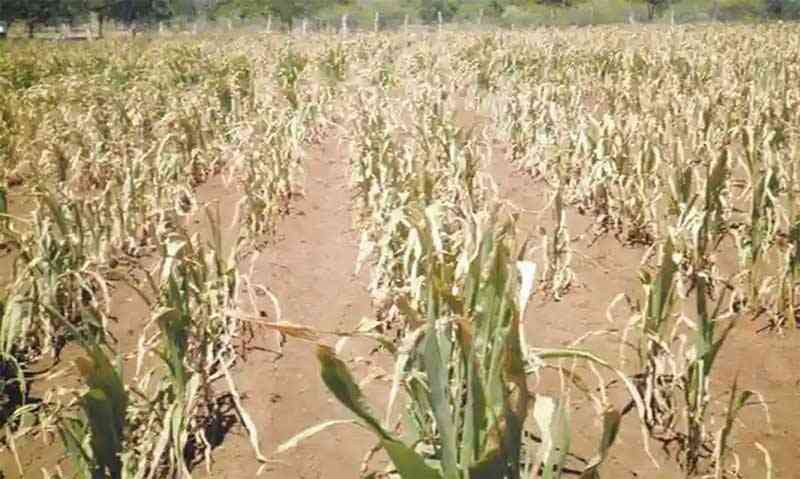
A PLANNED, collaborative and holistic management of natural resources promotes sustainable development for the enhancement of better livelihoods of people in various communities, it has been established.
Byron Mutingwende
The majority of people living in rural areas are almost entirely dependent on agriculture, farming and forest products.

However, impacts of climate change are threatening people’s ability to produce enough food for themselves as they are plagued by fluctuating temperature and rainfall patterns that cause a significant decline in production of major staple crops.
According to the Food, Agriculture and Natural Resources Policy Analysis Network (FANRPAN) chief executive officer, Dr Lindiwe Majele Sibanda, there is need for knowledge and responsive action that allows stakeholders to create the appropriate policy frameworks for building and adapting agriculture in order to improve food security.
“We need to develop networks and platforms where farmers, policymakers, researchers, the private sector, extension workers and civil society organisations are linked together in joint learning and knowledge exchange — catalysing and developing appropriate networks and true partnerships for action,” Sibanda said recently.
She was speaking at a workshop in Harare convened to generate valuable and timely evidence on climate change and household vulnerabilities.
- Chamisa under fire over US$120K donation
- Mavhunga puts DeMbare into Chibuku quarterfinals
- Pension funds bet on Cabora Bassa oilfields
- Councils defy govt fire tender directive
Keep Reading
Harnessing knowledge for betterment of the environment, livelihoods
Environment Africa (EA), a non-governmental organisation with over 24 years’ experience in the sector, has been pushing for collaborative, innovative and a holistic, action–orientated way to protect and manage natural resources to promote sustainable development.
“We remain committed to sustainable development, Agenda 21, the Johannesburg Plan of Action and the Millenium Development Goals,” said Charlene Hewat, EA chief executive officer.
“Through our work, we know that sustainable development, together with conservation and communities, are key to addressing some of Africa’s challenges such as sustainable livelihoods, climate change, environmental governance and biodiversity.”
EA has embarked on many projects one of which is the Climate Change Project which has made a significant contribution to the national climate change strategy. Under this project is smart agriculture which has produced sterling results for farmers in such areas like Nyanga and Hwedza. It also recognises individual and corporate environmental champions who excel in environmental conservation and management.
Abraham Chaukura (48) — a headman and renowned beekeeper from Mutasa district — was the EA 2013 environmental champion farmer having dedicated himself to conserving the environment and uplifting the livelihoods of people in his community.
Chaukura owns 289 Kenyan Top Bar beehives and 53 Langstroth beehives. Part of his income comes through bee hiring.
“Last season, 60 hives with bees were hired by Claremont Orchards in Nyanga for pollination of apples at $2 per hive for one day for one and a half weeks. Every season, I saw 483kg of honey in Mutare and Nyanga. I am now training other farmers from my ward on beekeeping and am a renowned bee remover in Mutasa district,” Chaukura said.
Chaukura has planted 500 gum trees and 500 indigenous trees since 2012. He has also established two indigenous woodlots within the village as well as a gum tree nursery. To date he has donated seedlings to five schools in Mutasa district.
The environmental corporate champion unveiled on the occasion of EA Annual General Meeting was Lafarge Cement Zimbabwe which is certified by the Standards Association of Zimbabwe for ISO14001:2004, Environmental Management System.
Programmes to reduce carbon dioxide emissions to mitigate global warming threats are also pursued and to this end the company uses 25% of waste from other industries as raw materials and champions the cause for resource recovery and waste recycling.
To protect the environment, the company has diversified its sources of raw materials and types of mineral deposits. Lafarge has also improved effluent quality for the plant discharge points to green class. The regular cleaning of oil traps and discharge points and timely repairs on equipment has made this possible.
Climate–smart agriculture part of solution
Sibanda said agriculture contributes significantly to climate change factors and that it needs to be part of the solution. Zimbabweans were urged to be an integral part of the global discussion agenda on agriculture and climate change.
She said part of the solution is the creation of climate-smart agriculture solution programmes to counteract the effects of climate change factors.
Climate-smart agriculture is a pathway towards development and food security built on three pillars — increasing productivity and income, enhancing resilience of livelihoods and ecosystems and reducing greenhouse emissions.
“By failing to safeguard our natural resource base, farmers continue to experience diminishing returns on their investments; sadly, they have to sell off the meagre physical assets that they own,” she said.
“They are failing to feed their own families, and worse still the aging farming generation has failed to attract the youth as farming has become the business of the poor who depend on hand outs.”
She said this was the opportune time to craft the way forward for the country’s agricultural sector.
Sibanda said adapting to climate change and climate variability requires knowledge, innovation and responsive action.
She added that the knowledge would arm farmers with the information they need to adjust their operations each season, and knowledge and innovation that allows them to make the appropriate farming choices and investments for the future of our food systems.
Strategies and way forward
For EA and other environmental lobby groups, key areas of focus will be tackling the impacts of climate change within disadvantaged and vulnerable communities, with emphasis on rural areas.
There was need to embark on projects that will work to facilitate potential for income generation through promotion of sustainable non-timber forest products and utilisation and introduction of sustainable technologies.
Hodzonge also called for promotion of innovative ways of pooling resources at local levels for community led developments. He called for support of initiatives to deal with waste management in urban and peri-urban areas as well as the use of alternative renewable energy.
Central to achieving environmental sustainability was the pushing of the environmental justice agenda and creation of greater environmental awareness and accountability.
Gender dynamics in environmentally-friendly activities
Spiwe Mhembere, EA field officer for Manicaland region, said she works with previously economically disadvantaged and marginalised women from Chimanimani, Mutare rural and urban, Mutasa and Nyanga to embark on projects that improve their livelihoods.

Mhembere said the women were trained by EA on beekeeping and the project was bringing in some financial benefits since they sell raw and processed honey to members of their communities.
“Women from Chimanimani bring their beehives to Bumba Honey Processing Centre where honey will be processed and packaged in 500ml bottles for sale to people from their locality or Mutare city centre and its surrounding residential suburbs,” she said.
She said beekeeping was a cost-effective venture since the wax from the processed honey could also be used for making candles and floor polish.
“In the end, benefits from honey captured in simple beehives made of wood and tree barks will multiply immensely. What is needed is the management of forests in which the hives are kept through keeping away fires and smoke. In the process, we will be conserving our environment whilst enjoying economic benefits from the sale of honey, candles and floor polish,” said Susan Chikunya from Zimunya near Mutare.
The women also grow herbs like moringa, fennel and rosemary which are used as teas and spices for different soups and relish or meat dishes. Mhembere also said the women were trained on waste management which includes separation and recycling.
“Women from Mutare pick up discarded beer bottles that are not returned to beer-halls for value addition. We then clean them up and cut them using sisal fibre to make water-glasses. A set of six water-glasses costs $4 and we make hundreds of thousands of these. The profit is always high since we would have picked the empty beer bottles for free,” Mhembere said.
Empty cans of beer are also picked up to make candle stands which are sold for $1 each while scrap metal is used to make candle stands. The women also manufacture detergents they sell to non–governmental organisations and schools including St Mary’s and St Joseph’s high schools in Mutare.
They manufacture the detergents by mixing sulphonic acid, dye, perfume and caustic soda with water at the various stages.
“Each 2-litre bottle is sold for $2, a figure much cheaper compared to detergents sold by grocery stores and supermarkets,” said Cecilia Jakachira.











